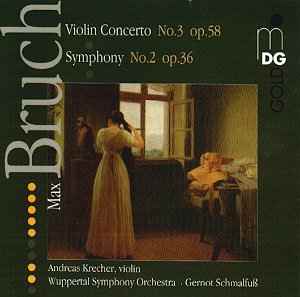
Bruch is making a modest come-back these days. His first violin concerto
and Scottish Fantasy kept him to the fore and still keeps his name there
in the consciousness of the vast majority of concert-goers. This in turn
pulled into the catalogue various works over the years. Most distinguished
among these remain the complete three symphonies from Leipzig under Kurt
Masur and the three violin concertos played by Accardo - both 1970s Philips
productions that continue in the catalogue. More recently the splendid Koch
International have recorded his Odysseus cantata - a recording and work greeted
with pleasure.
The third violin concerto has some of the sweetness of the first concerto
although the tunes are a couple of degrees below those in the first concerto.
The other concerto recalled by this work and the silvery playing of Andreas
Krecher is the Beethoven. The sense of time standing still and the whirring
machinery held back by beauty is very much to the fore in the Adagio which
is done with high poetry and a nice sense of dynamics. The finale breaks
with the Beethoven in tilting and disciplined bravura - always musical and
never tipping over into mere Barnum and Bailey. I thought I detected a Hungarian
element and the Brahms concerto's finale came to mind more than once. The
concerto is a wide-spanning work playing for longer than the second symphony.
The Symphony is shorter than the concerto by about a minute. The allegro
passionato is cloudy and overhung in the manner of the Eroica - lightning
flicker and thunder rends the eternal silence. Bruch is good at adagios and
the central one here is no exception. Schmalfuss and the Wuppertalers demonstrate
they can play with quiet yet empowered concentration as well as cleave the
heavens. The Brahmsian atmosphere has something in common with the central
movements of Brahms 2. The finale on the other hand is essentially peaceful
without the great storms of the first movement as if through the reflection
of the adagio a restful strength has been found. This is rather Brahmsian
- rather like the first and third symphonies with a touch of the well-known
Bizet symphony.
Excellent recording and performances in works which compete realistically
with those versions currently in the catalogue. MD&G are doing a great
service to us and to these orchestras in recording them in rare and even
rarer repertoire. Now how about some Marx (Herbstsinfonie desperately need),
Trapp, Bungert and Berger?
Reviewer
Rob Barnett

